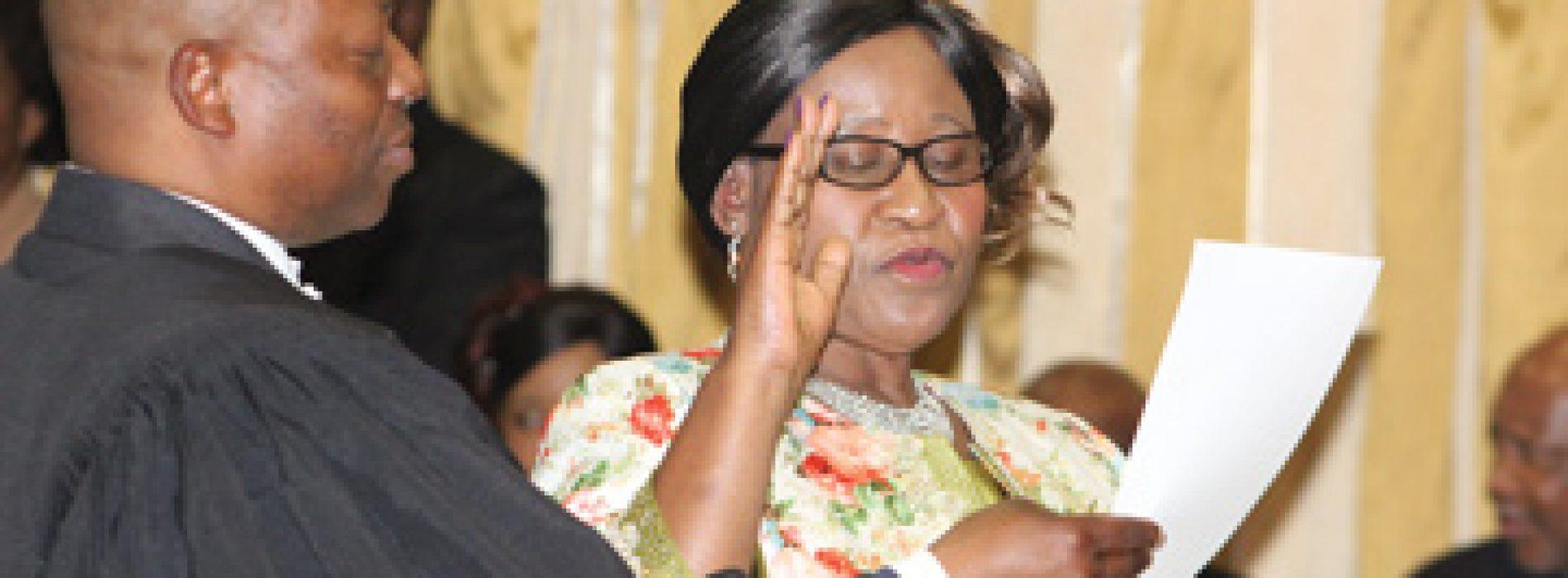Africa-Press – Lesotho. The mandate of the police in all democracies is to provide security, particularly to poor and underprivileged communities. During the 1970/80s, we saw this mandate suffering badly in Lesotho.
There was major loss of public trust due to the politicisation of the Lesotho Mounted Police Service (LMPS). This cancer (politicisation) institutionalised the privatisation of violence, which allowed the ruling party’s political fronts and cadres to terrorise opposition parties.
The politicisation of police also fuelled pervasive corruption in the police administration which resulted in a decline in professionalism and corporate coherence of law enforcing agencies.
It was not until the reintroduction of democracy in 1993 that the new governments made major strides in reversing these worrying developments. Recently we saw the above disturbing signs within the LMPS emerging once again.
The Police
The police service should be a benign, popular force that works for the benefit of society as a whole and guards the weak against the strong.
In fact, they are law enforcers and crime-fighters geared towards prevention and detection of crime and the arresting of criminals. They maintain peace and are ready to befriend anyone who abides by the law.
From this perspective, the police are not supposed to be political or partisan. They are the police of the public they serve, are neutral and independent, and also available to enforce the laws passed by Parliament without fear or favor. They are not the police of the government in power.
More than this, they should be seen as subject to the control of the people, partly as a result of the existence of formal channels of legal and democratic accountability but fundamentally as a result of their not being distinct from the people and imbued with the sense that their power derives from public consent not coercion.
Disturbing signs
An indicative aspect of politicisation that hinders good governance of the LMPS occurred on July 13, 2017, when 42 police officers promotions were cancelled.
This was despite the fact that the High Court of Lesotho CIV/APN/216/2017 and CIV/APN/216B/2017 had ordered against the cancellation. Nevertheless, the government went on to inform the concerned LMPS officers that they would cease to hold the new positions.
This action was a blatant violation of the rule of law and undermined the directive of the High Court of Lesotho. The question is why the government went ahead in cancelling these promotions whereas the High Court had ordered that no action shall be taken until the case is heard.
This is in spite of the fact that these promotions went through a rigorous, principled governance procedure and nobody deviated from the rulebook. It remains to be seen how the Court will eventually rule on this case when it resumes.
The police can be easily influenced by a negative narrative, more especially when that narrative comes from senior government officials, more especially the Prime Minister.
During the 2012-2015 coalition government, the Prime Minister used to order the police during political rallies to arrest some individuals and even telling them to castrate suspects.
This narrative was extremely worrying in a democracy where law and order is supreme. One is considered innocent until proven guilty. This narrative has come back to haunt us.
During his first rally at his constituency on Sunday 16th July 2017, the current Prime Minister is alleged to have urged the police” to beat thieves whenever they are out of sight of the public”.
It is this type of narrative that promotes human rights violations in breach of democratic principles. The PM under the Constitution must assist the police with resources to conduct their work, not to urge them to violate human rights.
It has been these of statements that recently have subjected policing into partisan disputes. Almost a month after the new government assumed power, the country has seen appointments and forced retrenchments of five commissioners.
This move on the part of government is indicative of a combative government that is determined to politicise the police service. First, it was Commissioner Letsoepa who was forced to take three months leave and his bodyguards removed. Deputy Commissioner Monaheng was appointed as Acting Commissioner. He was subsequently, removed from this Acting position on the 19th July 2017.
Three weeks earlier, a retired Deputy Commissioner who was alleged to have ordered Police officers during a police function that they should vote for the current Prime Minister’s party “All Basotho Convention (ABC)” was recalled from his retirement.
He was subsequently appointed an Acting Police Commissioner on the 19th July 2017. All these efforts of government are nothing but politicisation of LMPS.
Lest we forget, during the same week of the 18th July 2017, the Commissioner of Correctional Services Mrs Makhalemele and the first woman Commissioner of this institution, was also forced to take 90 days leave.
Secondly, the National Security Service (NSS) Director General was removed from his seconded post and returned to his substantive position in the Lesotho Defence Force.
Political involvement of the police is not per se a new phenomenon. Indeed it is well known that during the colonial period the police were in politics in a way to gain prominence during the 1980s.
They often owed their jobs and promotions to politicians hence were expected to cooperate with political parties, bosses and their activists. This is not what a democratic Lesotho wants at the moment. She needs a professional police force not one driven by political party interests. Lesotho is in dire need of constitutional reforms.
On the 18th July, 21 police officers who were earlier dismissed from the service for allegedly violating police conventions and the Police Act, by campaigning for the ABC and wearing ABC T-shirts and other disciplinary violations, were recalled by the government.
This was despite the fact that some of these officers lost their expulsion cases before the High Court. If this is not politicisation of the force then I am not sure what it is.
Earlier we said the police are not supposed to be partisan. But, the government’s act of recalling police officers who were retired for exhibiting their political affiliations openly in public leaves much to be desired.
It must be recalled that “on joining the police force each new constable takes an oath to carry out the duties without favour or affection, malice or ill-will”.
The police’s Disciplinary Code restricts the police from taking part in activities which the public might feel conflict with their impartiality. Police officers who middle in party politics as discussed above do not belong to the LMPS.
The country is on the verge of security reforms. Why then, is the government so keen to frustrate this national agenda by politicising the LMPS? Surely this does not send a good message to the nation.
While these cases raise serious questions, recent events point to a new and far significant politicisation of the police. This politicisation exacerbates the problems that have been inherent in Lesotho’s politics.
For example, the use of the police to enforce the status quo against opposition groups. But more significantly, they raise questions that are at the very basis of our conception of the role of the police.
Conclusion
By politicizing the police service, the government has been compromising the principle of a strictly impartial and independent police service. By cancelling police promotions, they have sent a wrong message to the public and the police.
By re-engaging Police officers who were dismissed on account of being engaged in active politics and desecrating the High Court ruling which declared that their dismissal was lawful is completely out of order.
These actions by the government fall directly within the sphere of politicisation of the service. The utterances of the Prime Minister at his rally, which advocated for the police to violate human rights, are completely undemocratic.
Such statements are not expected to come from a leader of a democratic country. To frequently reinstate, redeploy and dismiss Commissioners of Police is tantamount to killing this national service. The government is creating an unprofessional police service that will only serve partisan interest rather than national interests.
It must be clear that, policing is defined as a purely technical matter that involves skilled judgements that can only be acquired through training, experience and operational involvement in police work.
Therefore, elected representatives can never be in a position to acquire this kind of detailed knowledge. It’s better to leave the police themselves to do their work.
After all they are professionals in this endeavor not politicians. Police are professional in their work and they have requisite expertise. All what we must do is to give them resources and stop interfering in their operations and appointments.
The politician’s job is to determine policing policies and to determine policing priorities. The importance of the police to our legal processes can hardly be overestimated.
The police are the interpreters of the legal order to the population; indeed, for many people, they are the sole source of contact with the legal system. The current wave of policisation in the LMPS will definitely hinder good governance.






